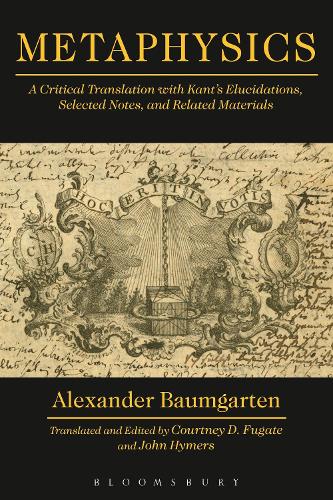
Metaphysics: A Critical Translation with Kant's Elucidations, Selected Notes, and Related Materials
(Paperback)
Publishing Details
Metaphysics: A Critical Translation with Kant's Elucidations, Selected Notes, and Related Materials
By (Author) Alexander Gottlieb Baumgarten
Translated by Courtney D. Fugate
Translated by John Hymers
Bloomsbury Publishing PLC
Bloomsbury Academic
13th March 2014
United Kingdom
Classifications
Tertiary Education
Non Fiction
Philosophical traditions and schools of thought
110
Physical Properties
Paperback
496
Width 156mm, Height 234mm, Spine 30mm
740g
Description
Now available for the first time in English, this critical translation of Metaphysica draws from the original seven Latin editions, the Academy edition of Kant, and Georg Friedrich Meiers 18th-century German translation. To assist and support the reading of this crucial text, the translation features: * historical and philosophical introductions and sketches * extensive glossaries and notes * clear reproductions of Kants elucidations and handwritten notes * Eberhards insertions in the 1783 German edition Used as a philosophical instruction for thinkers such as Kant, Mendelssohn, Abbt, Herder, and Maimon, Metaphysica is arguably one of philosophys most influential texts. Equipped with supportive and illuminating introductory material, this clear and lucid translation presents scholars of Kant, German philosophy and the history of philosophy with an indispensable resource.
Reviews
Baumgarten's Metaphysica was both a refined restatement of the German rationalism of Leibniz and Wolff and an original work of philosophy. Not merely the textbook for Immanuel Kant's lectures on metaphysics and anthropology, it fundamentally shaped Kant's "Critical Philosophy" and through that most of later German philosophy. This lucid translation finally makes Baumgarten's seminal work available in English . . . indispensable for all future students of Kant and German philosophy. -- Paul Guyer, Jonathan Nelson Professor of Humanities and Philosophy, Brown University, USA
Baumgartens manual was enormously influential and widely discussed in Kants time in matters such as metaphysics, cosmology, and psychology. Kant used it repeatedly in many of his courses and annotated it extensively. This volume offers the first full translation of Baumgartens Metaphysics (in its fourth, 1757 edition) in English, inclusive of Kants hand-written elucidations. It is a very welcome addition to the primary sources available to scholars. The current state of debate makes this a timely contribution that will help anyone interested in Kant to gauge in a more accurate and historically informed fashion the extent of his relation to his eighteenth-century German predecessors. Fugate and Hymers rich, attentive and scrupulous critical notes never make the reader feel unassisted in this undertaking. -- Alfredo Ferrarin, University of Pisa, Italy
Of all the philosophical works of Kants predecessors and contemporaries that have remained untranslated into English in their entirety, Alexander Baumgartens Metaphysics is likely the most important for an understanding of Kants theoretical philosophy. But Fugate and Hymers volume goes well beyond what we could have reasonably hoped for. It provides not only a meticulous translation of Baumgartens Metaphysics and lengthy notes on the translation, but also an overview of Baumgartens life and philosophy, an assessment of the relations of this philosophy to the philosophies of Wolff, Leibniz, Meier, and Kant; a translation of all of Kants Erluterungen (elucidations) of Baumgartens text; and an extensive glossary and index. Fugate and Hymers have simply produced an exceptional volume that will be of great value to Kant scholarship, and we can only hope that they will engage in similar translation projects in the future. * Julian Wuerth, Associate Professor of Philosophy, Vanderbilt University USA *
The influence of Baumgarten's philosophy in the eighteenth century, and on Kant's system in particular, cannot be overestimated. Its structure is a major catalyst for the form and content of much of even Kant's critical work, and especially of its metaphysics. This new English edition is therefore essential reading for all scholars interested in the most substantive work of the period. * Karl Ameriks, McMahon-Hank Professor of Philosophy, University of Notre Dame, USA *
A splendid and permanent contribution to the study of modern philosophy. The well-researched and fully accurate English translation of Baumgartens work takes proper account of contemporaneous Latin usage as well as key philosophical concepts, especially the concepts underlying the development of metaphysical thinking in eighteenth-century Germany after Leibniz. The translators historically contextualizing introduction, textual annotations, and ancillary translations of Kants notes on the Metaphysica will thus be remarkably useful to anyone who wants to understand what goes on in a highly significant phase of early modern philosophy. It almost goes without saying that Kant scholars should find this book indispensable. It is, for example, the ideal accompanying volume for graduate seminars on The Critique of Pure Reason that seek to come to grips directly with Kants own understanding of metaphysics. * Jeffrey Edwards, Associate Professor of Philosophy, Stony Brook University, USA *
Such texts are invaluable, providing the evidentiary basis for the best of the history of philosophy ... A brilliant edition! -- Iain Grant, UWE Bristol, UK
Fugate and Hymerss translation of Baumgartens Metaphysica is an excellent contribution to the historical, contextual and comparative study of eighteenth-century German philosophy. In addition to highlighting Baumgartens own contributions to philosophy during this period, their translation will help scholars understand the relationship between the LeibnizianWolffian philosophy and Kants philosophy more critically. * Journal for Eighteenth-Century Studies *
Author Bio
Alexander Baumgarten (1714 - 1762) was among the first to teach the controversial philosophy of Christian Wolff (1769-1764). By order of the king, he moved to Frankfurt on the Order in 1739, where he remained until his death in 1762. His most influential philosophical works are Metaphysics (1739), Philosophical Ethics (1740), and Aesthetics (2 Vols, 1750 & 1757). It is as formulated in these works that the Leibniz-Wolff tradition was chiefly communicated to later German philosophers, including Immanuel Kant. Today Baumgarten is also regarded as a central founder of modern aesthetics. John Hymers is Assistant Professor of Philosophy at La Salle University, USA. Courtney D. Fugate is Assistant Professor at the American University of Beirut, Lebanon.
